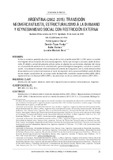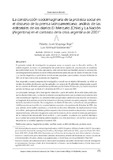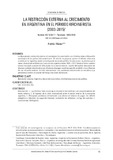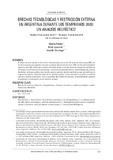Argentina (2002-2015): neo-mercantilist transition, diamond s way structuralism, and social keynesianism with external restriction
Argentina (2002-2015): transição neomercantilista, estruturalismo à la diamand e keynesianismo social com restrição externa;
Argentina (2002 - 2015): transición neomercantilista, estructuralismo á la diamand y keynesianismo social con restricción externa
Compartir este ítem
Fecha
2019-09-30Autor
Chena, Pablo Ignacio
Panigo, Demián Tupac
Wahren, Pablo
Bona, Leandro Marcelo
Citación
Metadatos
Mostrar el registro completo del ítemDocumentos PDF
Resumen
There is a broad consensus that the crisis that occurred between 2001 and 2002 marked a change in the cumulation system of the Argentinian economy, a fact that gave rise to a new development mode. The main goal of this article is to address the controversies around it in order to improve the general characterization of the emerging regime, and to update its periodization. By combining the institutionalist approach of the Regulation Theory with the Latin American structuralist vision of external restrictions, the regulation mode of post-convertibility can be divided into three constitutive stages of the same development mode: neo-mercantilist transition (2002-2004), Diamond s wayregulationism (2004-2009), and social Keynesianism with external restriction (2009-2015). Há um consenso geral de que a crise que ocorreu entre 2001 e 2002 marcou uma mudança no regime de acumulação da economia argentina, fato que deu origem a um novo modo de desenvolvimento. O principal objetivo deste artigo é abordar as controvérsias em torno dele, a fim de melhorar a caracterização geral do regime emergente e atualizar sua periodização. Ao combinar a abordagem institucionalista da teoria da regulação com a visão estruturalista latino-americana de restrição externa, o modo de regulação da pós-conversibilidade pode ser dividido em três estágios constitutivos de um mesmo modo de desenvolvimento: transição neomercantilista (2002-2004), regulacionismo à la Diamand (2004-2009) e keynesianismo social com restrição externa (2010-2015). Existe un consenso generalizado acerca de que de la crisis acaecida entre 2001 y 2002 marcó un cambio en el régimen de acumulación de la economía argentina, hecho que dio lugar a un nuevo modo de desarrollo. El objetivo central del presente artículo radica en abordar las controversias alrededor del mismo con el propósito de perfeccionar la caracterización general del régimen emergente y actualizar su periodización. Al combinar el enfoque institucionalista de la teoría de la regulación con la visión estructuralista latinoamericana de la restricción externa, el modo de regulación de la posconvertibilidad puede dividirse en tres etapas constitutivas de un mismo modo de desarrollo: transición neomercantilista (2002 - 2004), regulacionismo á la Diamand (2004 - 2009) y keynesianismo social con restricción externa (2009 - 2015).
Colecciones
Ítems relacionados
Mostrando ítems relacionados por Título, Autor o Palabra clave.
-
The socioimaginary construction of social protest in the discourse of the latin american press: analysis of the editorials of El Mercurio (Chile) and la nación (Argentina) newspapers in the context of the argentine crisis of 2001
Mayorga Rojel, Alberto Javier; Nitrihual Valdebenito, Luis AlejandroThe present research work is proposed as a space for theoretical discussion and empirical analysis around the problematic of the power of the media in contexts of social conflict. Explicitly, this paper aims to analyze the ... -
The external restriction on growth in Argentina in the kirchnerist period (2003-2015)
Wainer, Andrés (Universidad de MedellínFacultad de Ciencias Económicas y AdministrativasMedellín, 2019-09-30)The so-called external restriction on growth has been a historic obstacle to the economic development of Latin American countries. This article aims to contribute to the debate on this issue in Argentina, from an approach ... -
Technological gaps and external restriction in Argentina during the early 2000s: a heuristic analysis
Abeles, Martín; Lavarello, Pablo; Montagu, Haroldo (Universidad de MedellínFacultad de Ciencias Económicas y AdministrativasMedellín, 2019-09-30)The purpose of this paper is to discuss the deep determinants of the external restriction in the light of the Argentine experience during the first decade of the 2000s.The hypothesis according to which ER results from the ...





